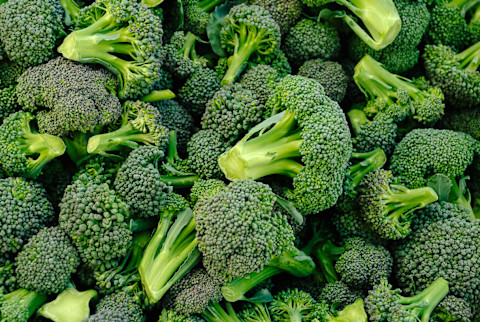Why Cruciferous Vegetables Can Be Tough On The Gut + A Supplement To Ease The Bloat

If you've ever enjoyed a bowl of roasted vegetables, or a big kale salad, and wound up feeling bloated afterward, you wouldn't be alone. While regarded primarily as a health food rich in fiber and nutrients, that whole class of cruciferous vegetables are not the easiest plants to digest.
Here's a bit about why that is, plus how you can still enjoy all your favorite veggies sans bloat.
Here's why the broccoli is making you bloated.
Whether it's broccoli or Brussels sprouts, cruciferous vegetables can cause some discomfort. According to registered dietitian Jessica Cording, M.S., R.D., CDN, this is in part because cruciferous vegetables contain glucosinolates, or sulfur-containing chemicals. "As glucosinolates break down in the intestines, they form other compounds like hydrogen sulfide, which is why gas passed after eating these foods smells like sulfur," Cording previously wrote for mindbodygreen.
She adds that cruciferous vegetables contain raffinose as well, an oligosaccharide that we can't digest as humans. "This means that, since it didn't get digested in the small intestines, when it enters the large intestine undigested, that's where you're likely to experience gas and bloating as bacteria in the intestines start to ferment that undigested food," she explains.
Some common cruciferous culprits include (but aren't limited to) broccoli, Brussels sprouts, cabbage, cauliflower, kale, arugula, bok choy, and collard greens.
How advanced probiotic+ with bloat support can aid abdominal comfort.
Tackling bloating starts in the gut and, further, with the right probiotic. As integrative medicine doctor Amy Shah, M.D., previously explained to mindbodygreen, "We do know that taking probiotics on a regular basis can support a healthy microbial balance in the gut, which can combat or ease bloating."*
And not only that, but research has found specific strains of probiotics, including Bifidobacterium lactis Bi-07, Bifidobacterium lactis HN019, and Lactobacillus acidophilus NCFM, can help support regularity and east bloat.*
So if you're ready to enjoy your favorite cruciferous veggies again, allow us to introduce you to mindbodygreen's own advanced probiotic+ with bloat support. This unique formula features a combination of three clinically tested strains of bacteria (including the three aforementioned strains), which are research-backed to help ease bloating, aid digestion, and support your gut microbiome.*
As one happy reviewer, Brandon T., writes of our probiotic, "Really helps reduce bloating. Great product," with another, Monica V., writing, "My stomach bloat was gone after consistently taking this for two weeks. Highly recommend!"*
The takeaway.
If you can't enjoy a side of cauliflower with your dinner because it leads to gas and bloating, you can blame the glucosinolates and raffinose. But the good news is, the right probiotic with targeted strains for easing bloat could be just the solution you're looking for.

